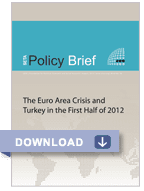
The Euro Area Crisis and Turkey in the First Half of 2012
August 27, 2012It has been almost four years since the global financial crisis started in 2008 and it has become an inherently European affair.
 By Erdal Tanas Karagöl & Evrydiki Fotopoulou
By Erdal Tanas Karagöl & Evrydiki Fotopoulou
It has been almost four years since the global financial crisis started in 2008 and it has become an inherently European affair. One after another, weaker European economies seeing their growth plummeting have become unable to recover on their own and are resorting to loans from the International Monetary Fund (IMF), European Central Bank (ECB) and the European Union (EU). Already, Ireland, Greece and Portugal have requested full bailouts with Southern Cyprus as the newcomer, still under negotiation, while Spain has requested only partial assistance not acknowledging it may soon need full support. Many experts predict that Italy will follow suit as it is quite possible that it will be the next which without any access to credit markets to finance its needs. This policy analysis sheds some light on the current status of these countries: how the crisis was brought about, what measures they took, how have they performed thus far and what are the prospects for them.
The role of the European Union is also being discussed in reference to the hesitant way it has addressed the problem and the cracks that appeared in the European establishment due to lack of mutual understanding and cooperation. In contrast to the weaker European economies, neighboring Turkey has managed to recover fast and exhibit positive signs that the economy is moving towards more sustainable growth rates while dealing with domestic vulnerabilities. This comparison serves as a reminder to reconsider both the usefulness of the single currency as well as whether Turkey’s economy would benefit from closer ties with it, given that Europe faces a continued slowdown at least until 2014.



























